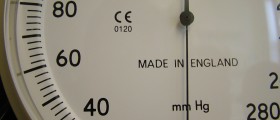
Hypertension, also known as the high blood pressure is a common health complaint. High blood pressure is best described as the force of the blood against the artery walls that is high enough to interfere with the normal functioning of the body and it causes various health problems, especially heart disease. The disease occurs as a result of malfunction of arterial pressure control mechanisms. Hypertension occurs when there is an increased cardiac output plus an increased peripheral vascular resistance. The more blood the heart pumps and the narrower the arteries are, the higher the blood pressure will be. Hypertension is characterized by diastolic pressure of 90 mm Hg or higher, and systolic pressure of 140 mm Hg or higher.
Causes of hypertension
The exact cause is yet unknown but many different factors may contribute to the blood pressure elevation. Primary hypertension develops with no identifiable cause, gradually and over many years. This is the norm in approximately 95% of all cases of hypertension.
Secondary hypertension occurs as a result of some other underlying condition such as kidney problems, adrenal gland tumors, renal disease, endocrine disorders or congenital defects in blood vessels. Hypertension may occur because of drug abuse, especially in people who are addicted to cocaine and amphetamines. High blood pressure may sometimes be caused by the use of certain medications such as birth control pills, cold remedies, decongestants, over-the-counter pain relievers and some prescription drugs.
Symptoms of hypertension
For most patients, hypertension is a silent disease that shows no obvious symptoms. If the symptoms appear, they usually consist of dull headaches, dizzy spells or a few more nosebleeds than normal. Unfortunately, the symptoms typically occur once when the disease reaches a serious and life-threatening stage. Hypertension is relatively easy to diagnose and each individual should have regular blood pressure readings at least every two years starting at age 20.
Risk factors for hypertension
As already mentioned, age is a significant risk factor for hypertension. The risk of elevated blood pressure levels increases with age. Women are more likely to develop hypertension after menopause. Race is another significant risk factor as there is a strong evidence that high blood pressure is common among black population, where it also develops earlier. Hypertension may also run in families. Being overweight also increases the pressure on the artery walls. Inactive people also tend to have higher blood pressure rates. People who are using tobacco, too much salt or too little potassium are also considered to be at a higher risk of hypertension. High levels of stress can also lead to a transitory but striking increase in blood pressure.
Treatment for hypertension
The blood pressure treatment depends on how healthy the individual is, or if there is another underlying disease which causes high blood pressure. Changing the lifestyle and taking regular controls of blood pressure is the first step of the treatment. Medications for the treatment of high blood pressure usually include thiazide diuretics, beta blockers, angiotensin-converting enzyme inhibitors, angiotensin II receptor blockers, calcium channel blockers and renin inhibitors.

















Your thoughts on this
Loading...